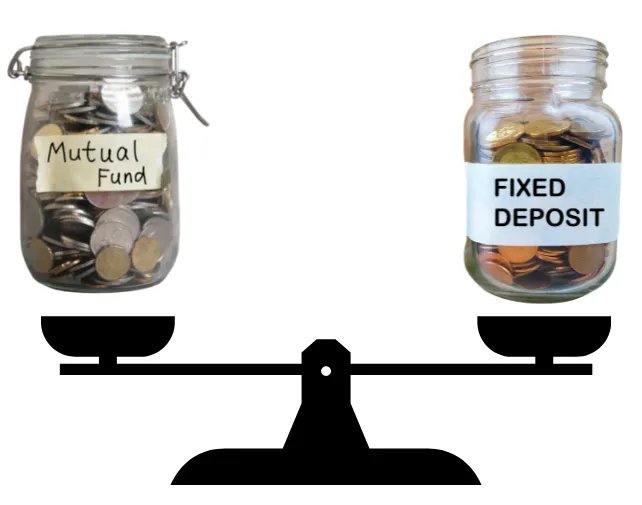Investments have always been done with a set intention to generally maximize returns and minimize risks. However, there can be other more specific goals. The goals get more specific when one is planning for investing for stable and continuous monthly returns or wealth creation over the long term and so on.
Nowadays, there are multiple investment options in the market, but still investors struggle with the dilemma of choosing one investment option over another. So, as an investor where would you choose to invest between the mutual fund and fixed deposits? Not sure? Well, we have got sorted for you.

Mutual Fund vs Fixed Deposit
Both mutual funds and fixed deposits are equally popular and trustworthy choices among investors. Each of these investment plans is one of a kind and provides investors with promising returns over a period of time.
But before investing in either of these investment plans, it is advisable to make a solid comparison. Thus, we have cumulated all the possible differences between Mutual Funds and Fixed Deposits. This list of differences will make the picture clearer and will help us pick the most attractive form of investment.
- Returns – Fixed deposits offer investors a definite and decided rate of interest for a predetermined period of time. This assures a fixed deposit will accrue a fixed number of returns for that certain duration. On the other hand, an investment in mutual funds could guarantee much higher returns. Mutual funds have can hold more potential in terms of returns as the investment is based entirely on the market standing of the stocks in the portfolio.
- Costs – Although mutual funds can promise greater returns but investing in them comes with certain costs. Mutual funds involve a certain fee criterion that has to be paid to fund managers who will take care of your portfolio. Whereas investing in fixed deposits does not require such a fee criterion as it does not involve any intermediaries to handle the process.

- Risk- The best part about Fixed deposits is that they are essentially zero-risk investments, as investors already know what their returns will look like in over time. The rate of interest is definite in fixed deposits, it is unsusceptible to market changes, therefore investors are guaranteed a fixed return after a fixed period of time. On the other hand, mutual funds are susceptible to the market performance and volatility. But the amount of risk involved is mitigated by the spread of risk over a range of stocks. This further gives a chance to the investor to gain more when the market conditions are favourable. But one has to be careful throughout as there can be a considerably low returns if market is too volatile and does not look like as you would have expected.
- Premature Withdrawal – Investors who would want to go for a premature withdrawal from their fixed deposits will have to pay a penalty for doing so. Even if the penalties are levied, the investor would also have to forfeit a portion of the returns that would have been expected. On the other hand, mutual funds allow premature withdrawals as long as the minimum holding period is completed. While there is no penalty involved, there will be an exit load charge of around one percent of the fund amount but only if a withdrawal takes place before the holding period gets expired.
- Taxation – Equity and hybrid funds are regarded as short-term only when the holding period is less than 12 months and long-term if the holding period is more than 12 months. When debt funds are held up for a period less than 36 months then they are short-term, whereas a holding period of 36 months and more are considered long-term funds. Equity mutual and hybrid mutual funds that go beyond Rs.1 lakh are taxed at ten percent and are termed long-term capital gains. While the equity mutual and hybrid mutual funds that are valued at less than Rs.1 lakh are taxed at fifteen percent and are termed as short-term capital gains. The case of fixed deposits is completely different from others as the interest that an investor earns on their investment is taxed according to the tax slab the investor belongs to or comes under.
Now where to invest?
Now you must be wondering which is better, then for that, you will have to ask some questions like what your requirements, goals, and the kind of risk you are ready to take. Once you get answers to such questions, you will be able to use the differentiation between mutual funds and fixed deposits.Most importantly, you as an investor must be clear about your aim of investing. If you are looking for continuous monthly returns, then a fixed deposit would be the right choice as it promises a monthly return option. However, Mutual funds can offer a higher rate of returns on your investment depending on market performance. But you have to prepare for adverse and unfavourable market conditions that will result in negative or lower than the expected returns on your investment.
Conclusion
In conclusion, it can be said that investing is all about finding a balance between mutual funds and fixed deposits. To find the perfect balance you must be determined about your goals and risk appetite and only then you can expect the desired returns. So, are you ready to invest in mutual funds or fixed deposits?


